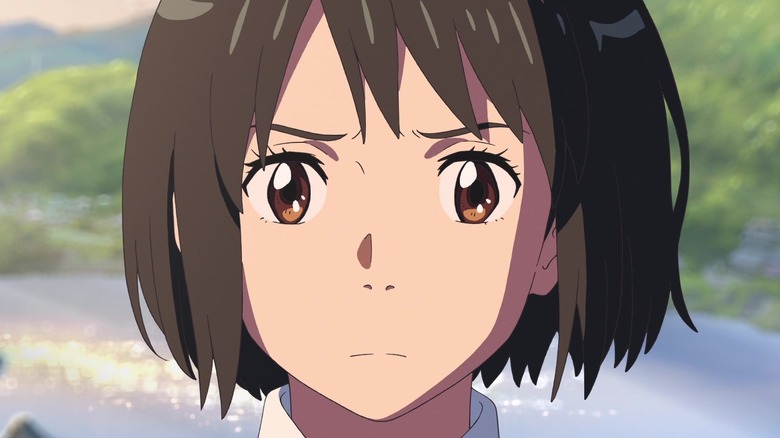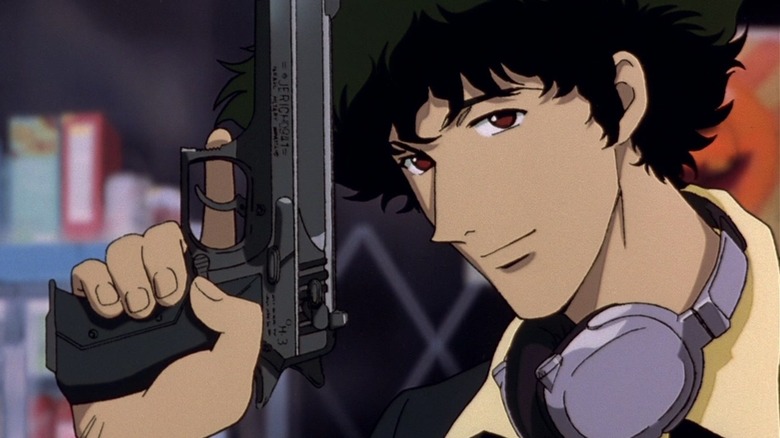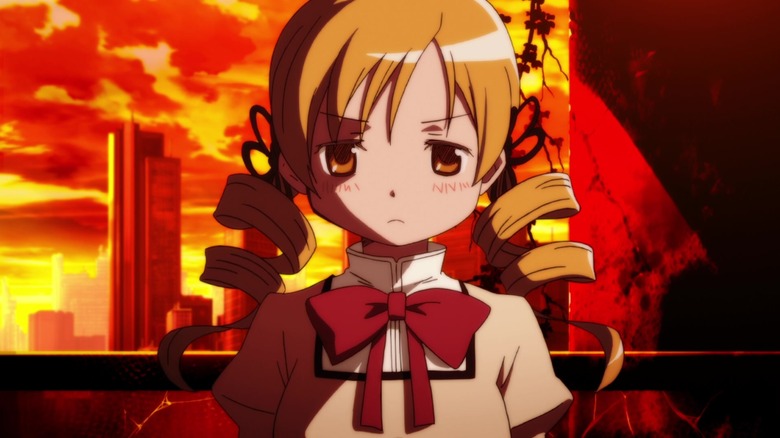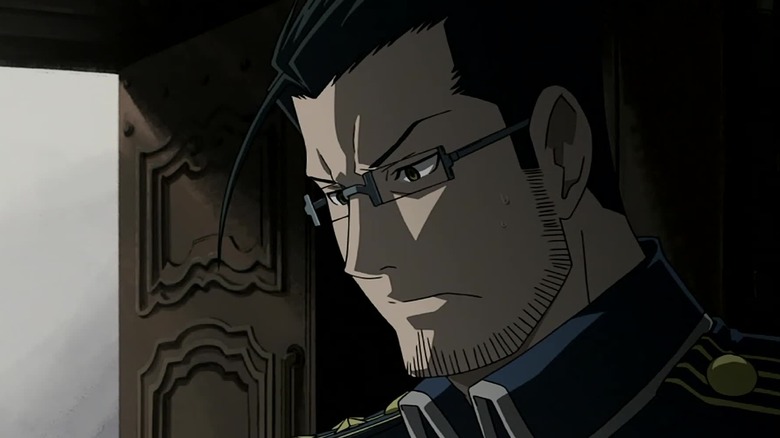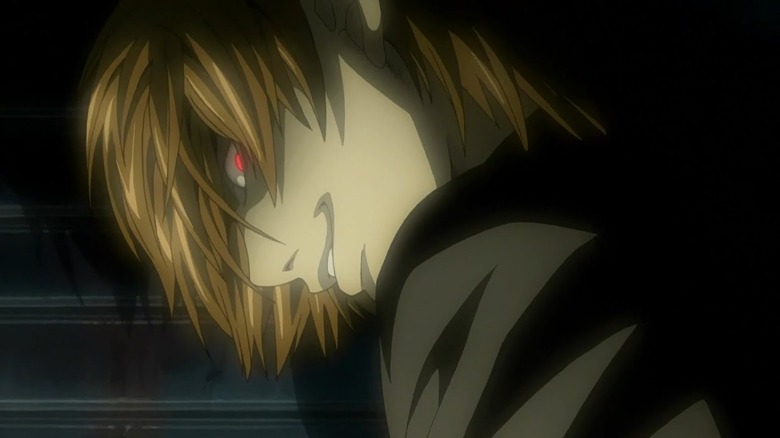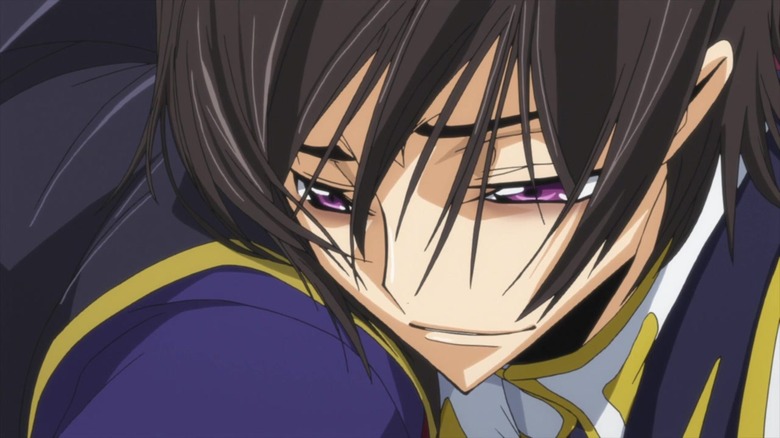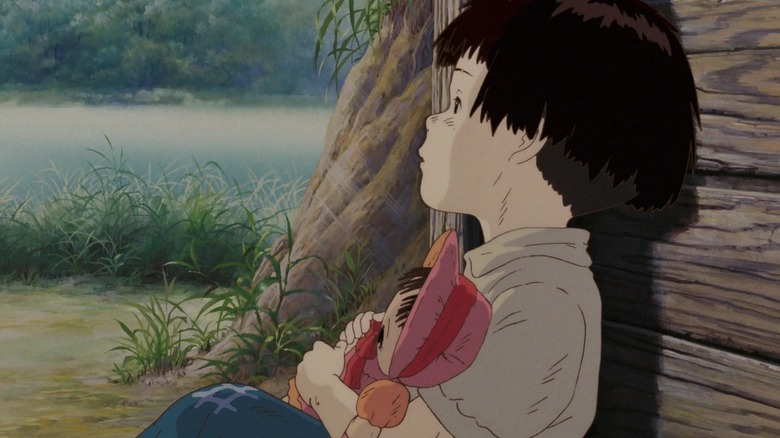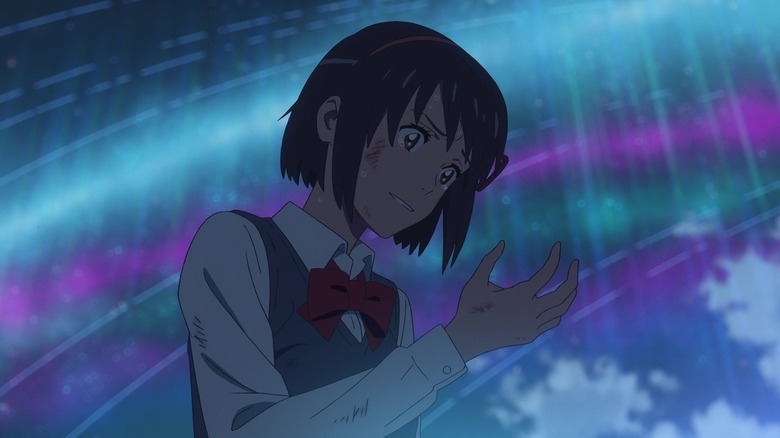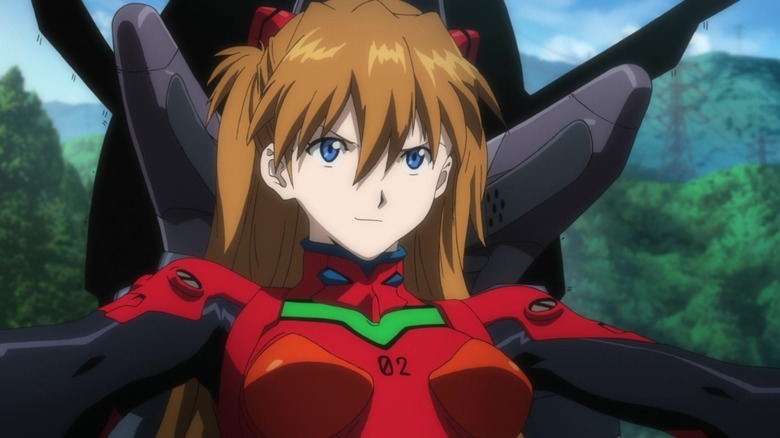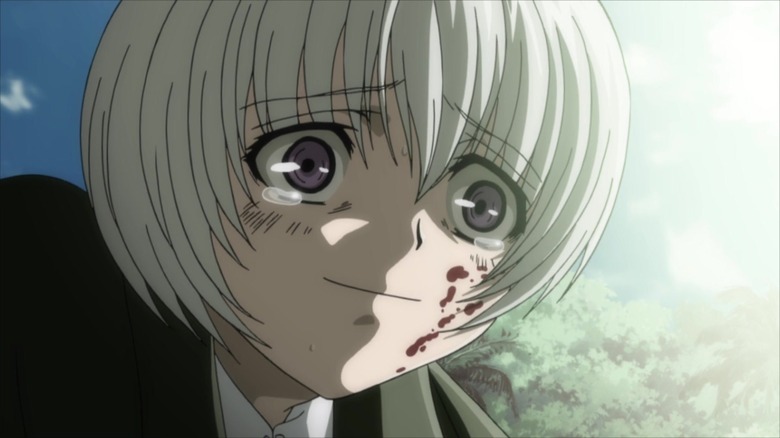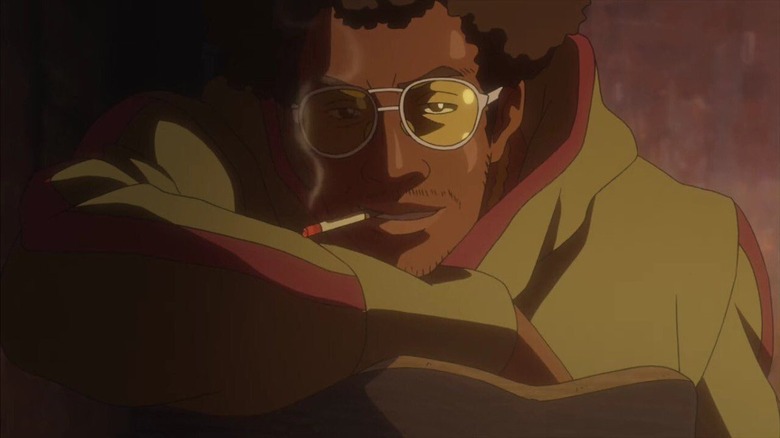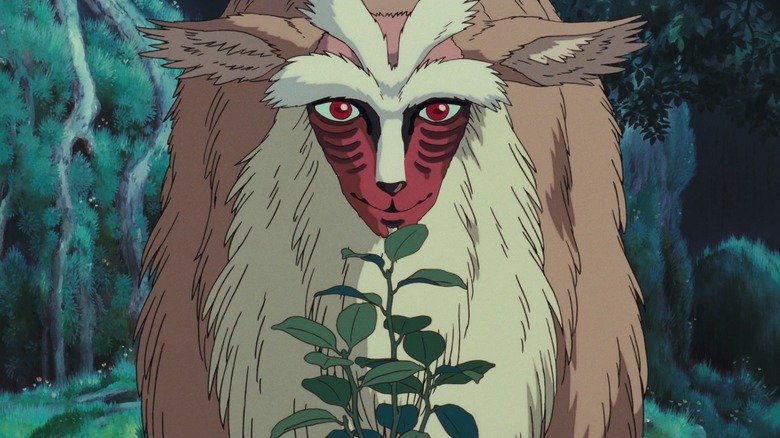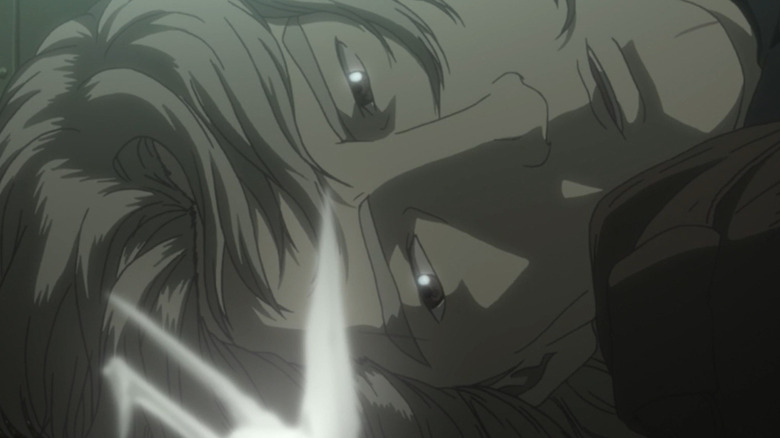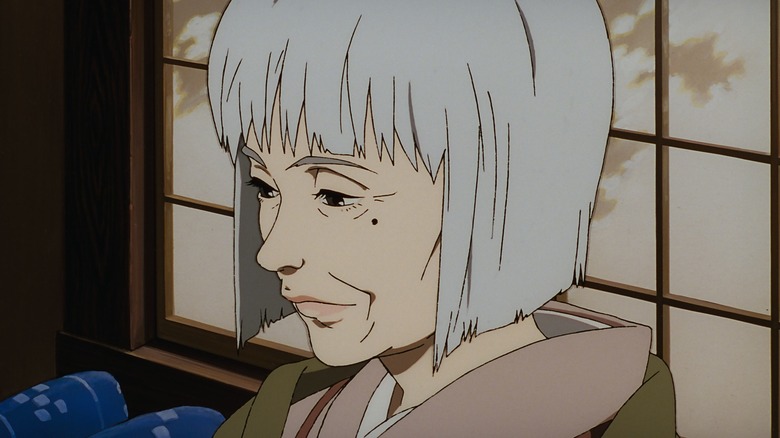The Saddest Deaths In Anime
Anime has always excelled at portraying intense emotion. Vividly capturing the white-hot thrill of battle has made "Dragon Ball Z" into a globe-spanning franchise. Studio Ghibli masterpieces like "Spirited Away" and "My Neighbor Totoro" succeed through their tender interpretations of childhood wonder. "My Love Story!!" is bubbling over with the elation of teen romance. But for every vibrant portrait of life's brightest moments, there is an equally intense evocation of misery. And there's nothing more gut-wrenchingly tragic than a well-done anime death.
Many of the greatest anime series and movies ever made are distinguished by their gut-wrenching portrayals of death. But even in this crowded field, certain anime deaths stand out as especially sad. Some of these fallen figures are beloved mentors who fall on the battlefield. Others are wide-eyed young people, cut down before they get the chance to strike out on their own. Some are simply people who get in over their head. What unites them all is that they're the saddest deaths in anime, so let's take a look at what makes them so tear-inducing.
Spike Spiegel (Cowboy Bebop)
"Cowboy Bebop" is a masterpiece. A big part of why is that, beyond its spectacular writing and fluid animation, it's simply and unequivocally cool. Spike Spiegel, the series' chain-smoking, bounty-hunting, hard-luck-having hero is the absolute pinnacle of that cool. From his rumpled suit to his killer moves, Spike oozes effortless finesse. Sure, he's pretty much always in need of cash, and yeah, he's been known to get his butt kicked from time to time. But even when he's broke and beaten, the man has undeniable style.
That's a big part of the reason his death is as devastating as it is. In the final two episodes of the series, "The Real Folk Blues Part 1" and "Part 2," Spike finally faces his past in the Red Dragon Syndicate. But for all the eye-poppingly cool tricks he pulls off in this finale — including killing Vicious, his arch-nemesis, at last — he still loses Julia, the woman who gives his life meaning. As he staggers down the stairs to his death, he's just a man, bereft of everything that matters to him. When he makes the shape of a gun with his fingers and pretends to shoot the gangsters closing in on him, it's a statement of purpose: He's still as full of dauntless panache as ever. But flair means nothing in a world without Julia.
Mami Tomoe (Puella Magi Madoka Magica)
"Puella Magi Madoka Magica" is chock-full of tragedy. The series' use of time travel means viewers watch each and every heroine bite the dust at one point or another — often multiple times. But even amidst all that death and destruction, Mami Tomoe's death in Episode 3, "I'm Not Afraid of Anything Anymore," stands out as particularly bleak.
Sayaka and Madoka are initially dazzled by Mami; the assured upperclassman is kind-hearted, poised, and a witch-slaying magical girl to boot. But fabulous abilities and a cute familiar have made Mami intensely lonely, a fact she reveals in this episode. When Madoka expresses her desire to become a magical girl as well, Mami dares to believe in a future full of trust and camaraderie. But this hopeful moment is cut short when Charlotte, one of the series' most memorable witches, bites Mami's head off.
"Madoka Magica" reveals its dark intentions with Mami's death. Apart from being the series' mission statement, however, it is also its beating heart. A kind-hearted girl drawn into a terrible bargain, Mami symbolizes every magical girl of the "Madoka Magica" universe. Madoka's ultimate sacrifice in the series finale is a victory for every exploited heroine, but above all, it's in honor of Mami, whose death echoes throughout the entire anime.
Maes Hughes (Fullmetal Alchemist: Brotherhood)
Maes Hughes is defined by love. The man cannot go a day without professing his undying devotion to his wife and daughter, who he portrays as just about the two greatest people to ever walk the Earth. Sure, sure, his alchemist colleagues can fundamentally alter reality with their own two hands, but have you seen how cute his baby girl is in his newest snapshot?
Hughes' overflowing adoration is hilarious and endearing, but it also highlights the other half of his personality: The brilliant, tactically-minded military officer. Hughes is a shrewd man who's spent most of his career surrounded by war, corruption, and shameless power-grabbing. Yet his clear-eyed nature doesn't corrode his soft heart, nor does his kindness make him naïve. His death in Episode 10, "Separate Destinations," unites the two halves of his soul: He is attacked while attempting to contact Roy Mustang with vital information, and dies while thinking of his wife and daughter. Love and duty cannot save Hughes, but they define him until he draws his final breath.
Kamina (Tengen Toppa Gurren Lagann)
Kamina is basically shonen anime incarnate. He's as deft with a sword as he is in the cockpit of a giant robot. He successfully pairs flip-flops with a floor-length opera cape while baring his muscular chest. He's the most hot-blooded person in an anime that pretty much runs on the logic-breaking properties of unbridled fighting spirit. His death, as a result, feels impossible. Just like Simon, the viewer gapes is disbelief at this turn of events in Episode 8, "Later, Buddy." Kamina? Kamina's dead? The dude who wins because of his absolute refusal to even believe in the concept of defeat?
Like so many mentor figures across media, Kamina has to die so that the hero of the series can grow up. Simon comes into his own in the next few episodes, and goes on to avenge Kamina on a literally cosmic scale. But when you re-watch "Tengen Toppa Gurren Lagann," there's still a part of you that refuses to believe Kamina will meet his maker. Surely a man so full of fire cannot fall — right? Such is the intensity of Kamina's appeal, and such is the breathtaking shock of his death.
Light Yagami (Death Note)
Light Yagami might be a megalomaniacal murderer with utterly immense delusions of grandeur, but darn it if he doesn't come close to justifying them. A straight-up genius, Light is brilliant at just about everything he tries. Sure, his desire to become "god of the new world" is bonkers, but given how long he gets away with killing thousands upon thousands of people, it's hard not to take it seriously. Really, who wouldn't let a magical notebook delivered by an honest-to-goodness god of death go to their head?
But Light's talent, ambition, and supernatural notebook can't keep him safe forever. In Episode 37, "New World," his edifice of lies finally comes crashing down as Near and the authorities expose him as Kira. Cornered, he goes for a piece of the Death Note hidden in his watch, but Matsuda riddles him with bullets before he can scratch out one last name. Light flees into a blighted industrial landscape, memories of the day he found the Death Note flooding him as he loses more and more blood. He dies a delirious failure in a rusting warehouse, a vision of L materializing as he fades away. Whatever your feelings on the guy, his death is haunting. No one can escape death — not even a man borrowing the powers of a death god.
Lelouch Lamperouge (Code Geass)
An exiled prince of the Holy Britannian Empire, Lelouch will stop at nothing to free the world of his father's control. When C.C., a mysterious green-haired woman bestows the Geass upon him, he gains the ability to force others into doing his bidding. Lelouch proceeds to disrupt the global status quo as Zero, leader of the Black Knights. After many battles, deaths, betrayals, and revelations, Lelouch becomes the 99th Emperor of the Holy Britannian Empire, with Suzaku, his best friend, at his side. But even that isn't enough: By the time the final episode of "Code Geass: Lelouch of the Rebellion R2" arrives, Lelouch has become ruler of the entire world.
Having apparently become a tyrant, Lelouch orders the public execution of his former allies, the Black Knights. But as he and his captives roll through the streets in the world's most grim parade, Suzaku, disguised as Zero, miraculously intervenes. With one swift strike, he impales Lelouch upon his sword. This is, we learn, the culmination of Lelouch and Suzaku's final scheme: Having become the focus of the world's hatred, Lelouch's death will bring about an era of peace. Lelouch's sister Nunnally, previously convinced of his evil, realizes the truth as Lelouch collapses beside her. Though the crowd is cheering its heart out, it can't quite drown out her desperate sobs.
Setsuko (Grave of the Fireflies)
Widely regarded as one of the most depressing works of anime ever committed to film, "Grave of the Fireflies" earns its bleak reputation in a hundred different ways. Siblings Seita and Setsuko, a teenage boy and a young girl respectively, are forced to survive the final few months of World War II on their own after they lose their home and mother in a firebombing. After they're driven from their aunt's overburdened house, their resources slowly dwindle. Though Seita is willing to do anything to save his sister, including looting houses as they're being bombed, there simply isn't enough of anything to go around.
Seita is laid low when he learns Japan has officially surrendered, and that his father is likely dead. Upon his return to the abandoned shelter the siblings call home, Setsuko, deep in a hallucination, offers him a pair of rocks to eat. Though Seita has managed to scrounge up some food, Setsuko is too wasted from malnutrition for it to make a difference. She dies clutching a half-eaten slice of watermelon.
Though it certainly has competition, Setsuko's death is the apex of the film's tragedy. When we think of war, we think of strategy, machinery, and subterfuge. But Setsuko, a child far removed from tactical meetings and munitions factories, is just as much a part of global conflict as any soldier. In portraying her death, "Grave of the Fireflies" highlights the unfathomable cost of victory.
Mitsuha Miyamizu (Your Name)
"Your Name" brings new meaning to the phrase "star-crossed lovers." Mitsuha, a small-town girl who longs for escape, inexplicably begins to switch bodies with Taki, a Tokyo boy living life at a considerably faster pace. Once the shock wears off, the two begin to enjoy the experience, and learn to communicate through written messages. Little by little, they fall in love. When their body-swapping inexplicably ends, Taki is determined to meet Mitsuha the old-fashioned way. But when he finally finds someone who's heard of Itomori, Mitsuha's hometown, Taki learns that it was destroyed three years prior by a comet fragment. Hundreds of people died, one of whom, a trip to the library confirms, was Mitsuha.
This is only the midpoint of the story, thankfully. But even when one re-watches "Your Name," this moment hits like the comet fragment that destroys Itomori. Upon reaching the ruined town, Taki is confronted by an enormous impact crater, scattered with twisted trains and fallen masonry. The messages Mitsuha left on Taki's phone disappear as he realizes they were separated by time as well as space — and soon enough, his memories of her begin to fade as well. The abruptness of this end to their romance, as well as Mitsuha's brief life, is shocking. Luckily, magic is flexible in "Your Name," as Taki soon discovers. But neither he, nor the audience, will soon forget the sight of Itomori, reduced to rubble.
Asuka Langley Soryu (Neon Genesis Evangelion)
If there's one thing Asuka loves more than excelling at whatever she does, it's being seen in the act of doing so. This makes her gruesome death in "The End of Evangelion" all the more disturbing: She fatally fails after giving her all, as everyone at Nerv watches in horror.
As the Japanese Strategic Self-Defense Force hurls everything it has at Nerv, Asuka, placed within Unit 02 for her own safety, is flooded with confidence and a renewed desire to live. She proceeds to wipe the floor with the JSSDF in one of the franchise's most spectacular action sequences. Even the sudden deployment of the mass-produced Eva units cannot stop her. But once Unit 02's battery runs dry, she learns the mass-produced Evas aren't quite finished with her.
Like a flock of carnivorous angels, they unsheathe their white wings, take to the sky, and descend upon her in a bloodthirsty frenzy. Yet even then, Asuka isn't out of the fight. As the mass-produced units circle, apparently having had their fill, she manages to reanimate Unit 02 through sheer rage, "I'll kill you," she whispers, "I'll kill you." She raises her arm — and thus, Unit 02's — to the sky ... only to see it split in two by a renewed assault from the mass-produced units. Asuka might go out a fighter, but her death is anything but triumphant.
Hansel (Black Lagoon)
"Black Lagoon" likes to take its ideas from the darkest corners of the 20th century. Hansel and Gretel, the homicidal twins whose story arc kicks off Season 2, serve as an especially intense example of this tendency. Raised in a Romanian orphanage during the era of Nicolae Ceaușescu, the fall of communism landed the twins in some of the cruelest corners of the criminal underground. Subjected to unthinkable brutality, they clung to each other and learned to kill. By the time they land in Roanapur, they've become bloodthirsty murderers who genuinely believe taking lives extends their own time on Earth.
Their deadly skills and twisted belief system are nothing to Balalaika, however. For the crime of killing her men, the ruthlessly efficient mob boss lures Hansel to a park surrounded by her highly-trained snipers in Episode 15, "Swan Song at Dawn." As Hansel dementedly details his belief system, Balalaika's resolve grows cold. She still kills him, of course — you don't become the head of Hotel Moscow by being soft. But there is no triumph in the moment her men shoot Hansel, who is only the monster the world made of him. "I'm getting too old for this," she mutters, after the boy finally breathes his last. "I feel ... I feel exhausted."
Satoshi Batista (Michiko to Hatchin)
Satoshi Batista might be a crime lord with a fierce reputation, but he's still a jealous child when it comes to Michiko Malandro. Years ago, Satoshi met Hiroshi, another kid condemned to life on the streets. They became inseparable — until Michiko came along. Satoshi is still angry at Michiko for (as he sees it) tempting Hiroshi from his side, nearly a decade later. Ironically, this makes him more like Michiko than he knows: She too is still haunted by Hiroshi's apparent disappearance, and searches for him with Hiroshi's estranged daughter, Hatchin, in tow.
For all his power and ruthlessness, Satoshi cannot let this one woman and her perceived sins go. This leads to his ignominious demise in Episode 21, "Last Waltz Blooming Out of Season." Having snatched Hatchin from Michiko's side, he ends up taking her to a nowhere town, ruled by a two-bit gangster. While there, he softens, ever so briefly, towards his departed friend's child. But then, with the cops in hot pursuit, Michiko manages to grab Hatchin and split. Satoshi shoots at the woman he hates and misses, eventually running out of bullets. Shortly afterward, he dies in an alleyway as the two-bit gangster and his cronies laugh. Though they pull the trigger, Satoshi is truly done in by his own grief. In letting the loss of Hiroshi take ugly root inside him, he ensures his own destruction.
The Forest Spirit (Princess Mononoke)
There are no true villains in "Princess Mononoke," but the forces of destruction and chaos are very much in play. Lady Eboshi, the leader of Iron Town, has created a sustainable haven for society's outcasts. To keep her people safe, she needs to ensure the steady production of iron, which means she needs to conquer the gods of the iron-rich mountain. When she beheads the Forest Spirit, it's a complex moment: Eboshi is clearly committing an act of great evil, but it's motivated by kindness and thoroughly-justified pragmatism.
With the Forest Spirit's death, the age of the gods has passed, ushering in the age of man. The fact that man, symbolized by Eboshi, is not acting out of pure greed makes the era's end feel all the more tragic; there is no smirking antagonist here, merely the inevitability of change. Though the Forest Spirit's death throes flood the mountain with poisonous ooze, he cannot stop the march of industry. San and Ashitaka manage to return the Forest Spirit's head, Eboshi vows to build a "better" town, and the kodama return to the forest. But the fact that the world our characters occupy has become one in which humans are capable of killing gods remains. Eboshi might learn her lesson, but she doesn't command all the forces of human greed. She's only the herald of a new, unstoppable age.
Hideo Kuze (Ghost in the Shell: Stand Alone Complex)
Hideo Kuze is an enigmatic figure. That's really saying something, considering a majority of the main characters of "Ghost in the Shell: Stand Alone Complex" are strong and silent types who keep their pasts to themselves. But Kuze, whose cyborg body prevents him from making facial expression, takes things to a new level of obscurity. Once a commando in the Japan Ground Self Defense Force, experiencing the horror and hypocrisy of war curdles Kuze's faith in his country. He reemerges as a revolutionary figure on behalf of the refugee population, and is later revealed to have known Motoko Kusanagi when they were children.
Kuze and Motoko are able to share a tender moment together in Episode 26 of Season 2, "Endless Gig." Whatever his methods, Kuze's motives are clearly noble, and in this scene, Motoko realizes he understands her loneliness as no one else does. But conflict tears them apart soon enough. Though bad guys are eventually thwarted and the day is mostly saved, Kuze is quietly assassinated by powers who fear his appeal to the masses. Whatever he means to Motoko, the refugee population, and the world, none of it matters to the man pulling the trigger. Kuze is just a man to him, and he dies like any other.
Chiyoko Fujiwara (Millennium Actress)
Chiyoko Fujiwara was once a major movie star. But by the time a pair of TV types find her at the beginning of "Millennium Actress," she's an old woman decades removed from her glory days. Over the course of this surreal, stirring movie, she plumbs the depths of her life as the interviewers look on, dazzled. The line between reality and fiction is blurred for Chiyoko: She recalls the events of her movies alongside the events of her life, as though there is no fundamental difference between them. Through the many years and landscapes of her life, she is driven by a single desire: To find a dissident artist she helped during the Sino-Japanese War.
As Chiyoko's tale comes to an end, an earthquake strikes, sending her to her deathbed. She never did find the artist, but that doesn't actually matter to her — what she really loved, she admits in her final moments, was the chase. As the old woman in the hospital bed fades into the young actress in a rocket ship, about to take off into sci-fi adventure, we realize Chiyoko's story has come to its conclusion. It's a triumphant death, to be sure, but its emotional resonance will have you in tears, regardless.
